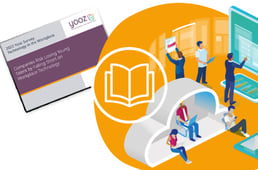Yooz’s 2024 AI in the Workplace Survey reveals AI resistance, fears and
opportunity among construction industry professionals.
Purpose of the Study
As the construction industry grapples with the potential of artificial intelligence, fears abound regarding its impact on job security, ethical issues and more. In a world in which AI is increasingly reshaping industries, the construction sector stands at an inflection point.
Yooz’s recent 2024 Yooz Survey: AI in the Workplace report revealed that negative news about AI is shaping widespread apprehension among U.S. workers. Within the construction industry, AI resistance is high–but cautious optimism is driving curiosity and the desire for more balanced and positive examples of AI adoption.
Construction Leads in AI Resistance
As we looked more closely at specific industries, we noticed a clear trend in the construction sector: it’s broadly perceived to have the least prevalent use of AI, as well as the highest level of AI resistance–a sentiment that was consistent both within and outside the industry.
High Awareness of Negative Uses of AI
Respondents in the construction industry also had higher levels of awareness of examples of negative uses of AI–such as phishing, identity theft, document forgery or transaction fraud–with 62% of respondents in the construction industry saying they’re familiar with these uses, in contrast to only 57% of respondents overall.
AI-Driven Job Loss is a Top Fear
Despite labor shortages across the industry, construction industry respondents fear AI-driven job loss more than respondents from other industries (46% vs. 40%), with only 15% saying it could create new job opportunities.
This fear is highest among Baby Boomers, with 55% fearing AI-driven job loss, compared to 50% of Gen X and 43% of Millennials who said the same.
High Optimism of the Ethical Use of AI
The construction industry is considerably more optimistic about AI being used ethically than those outside the industry. When asked about their level of optimism about the potential of AI to be used ethically and responsibly in business, 40% of construction industry respondents said they’re very optimistic and believe AI can be a powerful tool for good, vs. the 25% outside the industry who said the same.
This optimism is being driven by Millennials, with 65% labeling themselves as very optimistic, compared to the 24% of Gen X and 0% of Baby Boomers who said the same. 91% of Baby Boomers said they’re cautiously optimistic and think responsible use is possible but requires effort, with 25% of Millennials and 60% of Gen X saying the same.
Social Media Shapes AI Awareness
When asked where they encounter AI news, social media came in first (63%) among
construction industry respondents, followed by news websites (52%). Podcasts and YouTube channels came in third at 51%–significantly higher than the 37% of non-construction industries.
Among Millennials in the construction industry: 76% get their AI news from social media, compared to 55% of Gen X and 36% of Baby Boomers. 63% of Millennials turn to online forums like Reddit, compared to 31% of Gen X and 27% of Baby Boomers.
Industry Pros Demand More Balanced AI News
31% said they “strongly agree” with the statement “I would like to see more balanced coverage of artificial intelligence, with equal focus on both its positive and negative impact,” higher than the 17% of non-construction industry respondents who said the same.
Nearly half (48%) intentionally seek out positive AI stories often, compared to the 30% outside the industry.
How Can Construction Leaders Shift Perception to Encourage Embracing New
Technology?
Fears can be expected with any significant paradigm shift–from the invention of the wheel to the internet to AI–however the construction industry’s optimism and desire for balanced stories regarding AI use cases brings the promise of large-scale interest and adoption.
To begin shifting perception among colleagues and organizations in order to adopt AI technology, construction leaders should consider steps such as:
- Bridge the AI knowledge gap by supporting continuing education, sharing interesting articles and learnings, and hosting regular lunch and learns with teams.
- Educate on AI misconceptions with proactive conversations and focused team-wide learning opportunities.
- Showcase AI success stories, from highlighting incremental uses of AI within the
organization to sharing case studies and articles highlighting other organizations. - Drive dialogue prior to AI deployments with proactive communication, open
conversations and intentional feedback loops. - Provides hands-on experience with AI, allowing teams the freedom to experiment and propose new innovative ideas.
- Explore AI solutions and technologies that could be impactful in different areas of the business.
“The construction industry is the backbone of our nation, bringing the hope of unbridled growth and opportunity fueled by the AI transformation,” stated Laurent Charpentier, CEO of Yooz. “Despite early apprehension among construction workers, we’re encouraged to see that the industry is eager to understand the full potential of AI and harness its power to reach new heights of success.”






